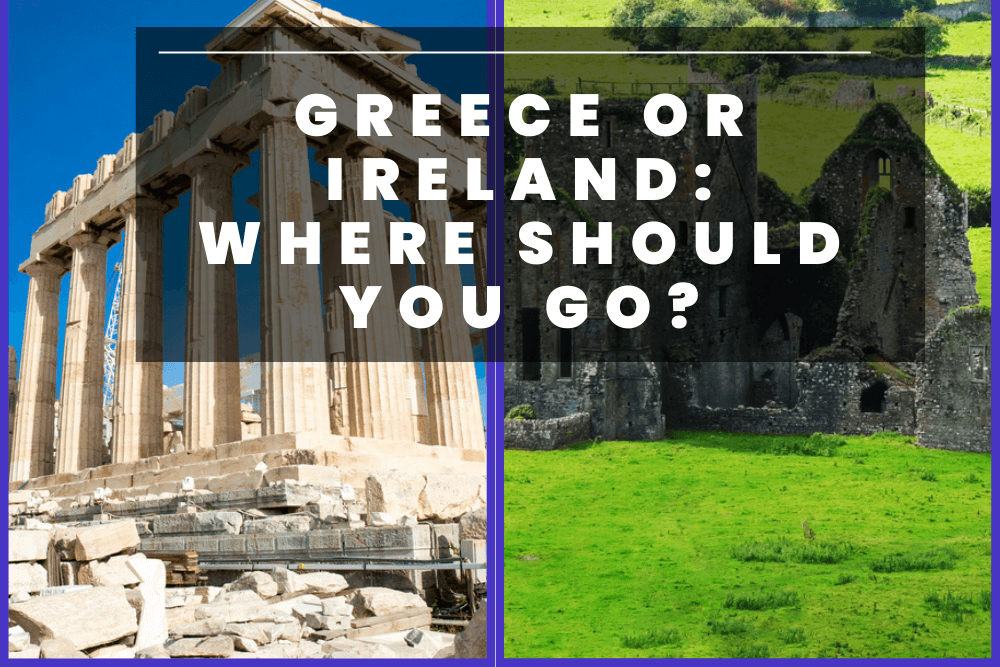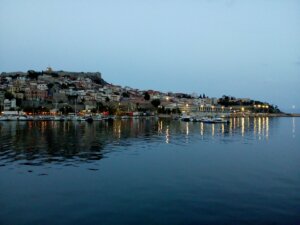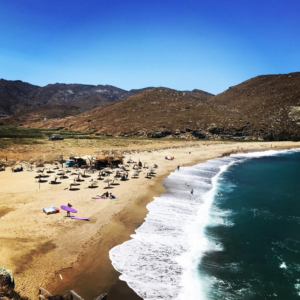Last updated on November 1st, 2023 at 04:36 pm

It might seem strange to compare Ireland and Greece since these countries are vastly different, but despite their differences both are brimming with history, culture, and natural beauty, and they offer distinct experiences to travelers.
Through their unique differences, and in some cases surprising similarities, you will be able to pick which destination truly suits you and your expectations of an abroad adventure.
So, what makes Greece and Ireland so different as holiday destinations?
Greece boasts sun-kissed Mediterranean beaches, 227 diverse islands, ancient ruins, vibrant local cuisine, and nightlife, while Ireland enchants with its evergreen rolling landscapes, sea cliffs with breathtaking views of the Atlantic, historic castles, and lively pub culture. Greece offers a warm, island-rich experience; at a much more affordable range, while an Irish folklore-infused adventure doesn’t come as cheap.
That’s just the tip of the iceberg when it comes to these two beautiful destinations. Growing up in Greece, I’ve managed to travel and explore all the beauty both the mainland and the islands can offer. I also moved to Ireland a few years back and set my mind to travel around the Emerald Isle, to discover its rugged coastlines and prehistoric monuments.
Through my own experience with both Greece and Ireland, I think I can help give an honest comparison between the two. So, prepare to discover these two destinations, the food, beaches, art and history they offer, and much more!
Snapshot Comparison
Greece:
- Home to 227 islands, some less touristy than others.
- Better and safer beaches for swimming and families.
- Better food and a better destination for exploring local cuisine.
- Many bars and clubs are open until sunrise.
- Tends to be significantly cheaper than Ireland.
- Ancient Greek monuments, museums, and ruins.
- Better and more predictable weather and temperatures
Ireland:
- Great for hiking and camping.
- The small size of Ireland makes it a great country for road trips.
- 30,000 Historic Castles and ruins as well as prehistoric sites.
- Old pubs and vibrant pub culture.
- St. Patrick’s Day!
- More diverse landscapes, from rolling hills to rugged cliffs, large national parks, and beautiful gardens.
- Better and safer roads.
A Quick Overview & Comparison Of Greece And Ireland
Both Ireland and Greece are riddled with must-see spots, each offering a unique adventure. But which country is the best option for you?
If you are looking for a relaxing summer vacation, where you can sip a traditional Greek ‘frappé’ or better a “Fredo Espresso” by the sea during the day, and enjoy a vibrant nightlife with energetic music and dance while drinking locally brewed beers, and fruity cocktails, then both the mainland and islands of Greece promise unforgettable memories.
If you are someone who loves traditional music sessions in cozy pubs and the warmth of local camaraderie, while also going to bed at a logical hour to explore Ireland’s majestic landscapes the next morning like the geological formations of the Aillwee Caves, with their stalactites and underground waterfalls, then Ireland is for you.
If you are the type of traveler who enjoys exploring destinations with deep religious significance, Greece’s Orthodox churches and festivals provide profound insights. Ascending Mount Athos in Greece, with its ancient monasteries, offers a spiritual pilgrimage. And if the allure of hidden monastic caves calls out to you, visit Meteora in Greece, with monasteries perched atop towering rock formations.
If you’re looking for prehistoric structures, Ireland’s Brú na Bóinne complex, older than the pyramids of Egypt, is an archaeological wonder. Make sure to also explore Ireland’s Drombeg stone circle, known as the ‘Druid’s Altar’, which unravels secrets of ancient astronomical alignments and rituals.
If you’re the type of traveler who finds joy in exploring vibrant markets, the bustling Monastiraki flea market in Athens offers treasures from antiques to local crafts. Similarly, the Mediterranean island festivities, like the Carnival of Skyros, with its unique rituals and costumes, are culturally enriching. The Panigiri celebrations in most Greek villages, on the mainland and islands alike, offer authentic food, dance, and merriment.
If the charm of medieval fairs with jousting and traditional crafts entices you, attending Ireland’s Loughrea Medieval Festival is a time-traveling treat. Or if you’re looking for something more ancient then the Beltane Fire Festival in Ireland is a vivid reimagining of Celtic ceremonies.
Finally, if you are someone who enjoys savoring diverse culinary experiences above all else then Greece’s medley of Mediterranean dishes will tantalize your taste buds!
Which Country Is Cheaper?
Planning a trip means that you also have to look at your wallet and decide where you can make the most of your trip without going bankrupt!
Accommodation:
So, let’s kick off with Ireland. The Emerald Isle can be on the pricey side, especially in hotspots like Dublin or Cork, and it seems that after the pandemic prices have gone even higher, especially in terms of accommodation, whether we’re talking hotels, hostels, or Airbnbs.
Greece, recovering from economic setbacks, has been pretty kind to travelers’ pockets. Accommodations range from super affordable to luxury. Mind you certain islands like Mykonos, Santorini, and Crete or big cities like Athens and Thessaloniki can be on the pricier side, but they still are not as expensive compared to Ireland’s top destinations.
It’s also important to note that there are plenty of Greek destinations that you can find, whether it’s Chalkidiki, or less well-known islands, where the hotels and Airbnbs are much cheaper.
A great example is Sifnos, a relatively cheap Island I visited last summer. Not only did I get to sunbathe and doze off at the island’s beautiful beaches, but I also got to eat the tastiest food, and take a million pictures of the isle’s captivating architecture!

Transportation:
Depending on the season, renting a car in Greece is usually cheaper compared to Ireland, so if you want to drive around a Greek Island then it will most likely cost you less.
Public transportation is also cheaper in Greece, as well as taxis, and even if you end up overpaying for a taxi, which can happen with tourists (so beware) you are likely to pay less in Greece compared to Irish standard taxi prices.
Activities And Attractions:
If you want to explore historical sights and visit museums and ruins, Greece has a lot to offer, including free museums, free activities, and free attractions. But even if you do have to pay for a ticket to enter some of them (like the Akropolis), or have a guide take you around significant historical sights then it’s usually much cheaper compared to Ireland.
Don’t get me wrong, Ireland also has plenty of free museums and attractions, but when they do charge the price can be significantly higher compared to Greece.
Food And Nightlife:
While we will be talking in depth about Irish and Greek cuisine later on, when it comes to prices, Greece is definitely much cheaper. Even if you choose a more expensive Greek destination, you will definitely save plenty of money food-wise.
When it comes to Ireland, unless your goal is to eat at a McDonald’s or Burger King, most local chippers and restaurants are going to be much more expensive, and to be honest oftentimes you’re not even paying for quality.
While high-class bars and clubs in Greece will most likely charge you as much as any Irish establishment will (unless we’re talking about the temple bar in Dublin), you can always find smaller local wine bars, or taverns where the alcohol is extremely cheap and you often get free or very cheap “meze” finger food with your drink.
So, What’s The Verdict?
If you’re traveling on a tight budget or you want a cheaper vacation that you can stretch through a long period of time, whether we’re talking about accommodation, transportation, activities as well as food and nightlife, then you should definitely consider Greece, while Santorini might have you shelling out more, other islands and the mainland often serve up savings.
Which Country Has The Best Food And Restaurants?
If food is an important part of your traveling experience then you need to ask yourself what type of cuisine speaks to your heart. I think most people can enjoy and love both Irish and Greek cuisine, but it’s important to point out how different the two are.
First up, Ireland. If the idea of sitting in a cozy, dim-lit pub while rain drizzles outside tickles your fancy, then you’re in for a treat! Irish food is like a warm hug from your grandmother. Think hearty stews, the fluffiest potatoes you’ve ever had, and yes, pies filled with pure goodness.
There’s a simplicity to Irish dishes, like a good Shepherd’s Pie and let’s not forget the classic Irish breakfast, that stuff’s designed to kickstart any day! If you’re planning on visiting a coastline town then you should also consider the local seafood. Fish and chips is a must!
That being said, you won’t get much more diversity than that going from one town to the other, since most Irish menus are typically the same and the food is definitely not cheap, especially if you’re indulging in some craft beers or quality whiskeys. When it comes to gastro-pubs or high-end dining, you usually need to book in advance, and spend a great deal of money and even then the food can be a hit or miss.
If you want to save money on food, then you will find it difficult to do it in Ireland, unless you’re planning on sticking to fast food chains.
Greek cousine on the other hand is a medley of fresh, zesty flavors. From very cheap dinners with homemade traditional food like the well-known mousaka to very affordable taverns where you can get multiple plates to share, like salads, feta, seafood, and grilled meats, all the way to upscale establishments where the same flavors are presented in the most gourmet fashion.
If you really want to save up on food, you can go to a cheaper tavern every night and the food is still going to be beyond delicious. More so, even the more touristy taverns and restaurants are pretty decent. But if you take your time to ask the locals for some advice on finding some less touristy spots then you will never want to leave Greece, or at the very least you will never forget the taste of Greek tomatoes.
So, What’s The Verdict?
If you don’t want to spend most of your money on food but you still want to enjoy a good dinner, full of flavor and character, then there’s no question about it, Greece is the one!
How Does The Culture And History Compare?
Ireland and Greece are so geographically distant, and both have unique offerings that appeal to different travelers and that’s the lens through which I’m going to approach these countries.
Both nations have faced external influences and invasions but have retained distinct cultural identities. They both celebrate their traditions with fervor, be it Greek festivals or Irish ceilidhs. Both societies place a high value on hospitality and the age-old tradition of welcoming strangers.
As a tourist, meeting friendly people is something I truly cherish, and I promise you that the hospitality of both Greece and Ireland is unparalleled!
Greece is often described as the cradle of Western civilization, and those fascinated by classical history, philosophy, mythology, or ancient architecture will find Greece irresistible. The blend of Eastern and Western influences over the millennia also offers a unique cultural exploration.
It’s the perfect place to explore magnificent ruins like the Parthenon, ancient theaters, and the Oracle of Delphi, or take a stroll through Byzantine monasteries and Ottoman-era bazaars. That being said, not all cities, villages, or even islands, are as breathtaking as the picturesque Santorini, or the often-overlooked Kavala of Northern Greece, as you can see in the photograph below.

Ireland’s overall architecture is more or less homogenous across the country, but certain cities and towns truly stand out, and I’m not just talking about the redbricked houses in Dublin. Kilkenny, Cork, Galway, and many more cities and towns are worth a visit!
This country’s past is a tapestry of ancient Celtic traditions, Viking invasions, Norman conquests, and a long struggle for independence. Stone Age monuments, medieval castles, and remnants of the colonial era dot the landscape, waiting for you to witness their beauty.
Not to mention the ancient stone circles, haunting landscapes like the Burren, and vibrant events like the Galway Arts Festival. Literature enthusiasts can trace the steps of their favorite Irish authors in Dublin’s literary pubs.
So, What’s The Verdict?
The true question you need to ask yourself is what landscape truly appeals to you.
Do you want to lose yourself in the world of ancient Greece, see the Akropolis with your own eyes, and discover how the Roman, Byzantine, and Ottoman Empires have influenced Greek architecture?
Are you perhaps going for a more medieval vibe, like narrow streets, old castles, and towers or do you want to know how the ancient Celts lived and how they buried their Kings and Queens? In this case, you need to visit Ireland.
How Do The Art And Entertainment Compare?
When it comes to art and entertainment, both Greece and Ireland offer a plethora of experiences, drawing from their deep historical wells and contemporary vibrancy. Let’s journey through their museums, historical monuments, nightlife, and festive offerings.
Museums And Historical Monuments:
Greece: If you’re thinking of traveling to Greece, specifically Athens then you need to visit the National Archaeological Museum in Athens, housing treasures from ancient Greece, and the Acropolis Museum, which offers a modern perspective on the ancient ruins. In Thessaloniki, the second biggest city in Greece, Rotunda, and the Archaeological Museum showcase Byzantine art and artifacts from Macedonia.
Greece is dotted with iconic historical sites. The Parthenon in Athens, the ancient theater of Epidaurus, the palace of Knossos in Crete, and the ancient city of Delphi are just a few. Each monument tells tales of ancient civilizations, mythologies, and empires.
Ireland: The National Museum of Ireland in Dublin gives insights into Irish art, culture, and natural history. For contemporary art lovers, the Irish Museum of Modern Art is a must-visit.
Ireland’s history is also etched in its megalithic tombs, monastic ruins, and colonial-era structures. Ireland’s historical landscape features the ancient Newgrange passage tomb, the medieval Rock of Cashel, and iconic castles like Blarney and Cahir.
And let’s not forget the biggest Dolmen in Europe, Brownshill Dolmen, located 3km east of Carlow town, weighing some 103 tonnes.

Festivals:
Greece: The Athens and Epidaurus Festival showcases theater, music, and dance, celebrating ancient to modern performances. Carnivals in Patra and Xanthi are colorful affairs with parades and masquerades. On the religious front, Greek Orthodox Easter is a profound experience.
Ireland: St. Patrick’s Day is a global phenomenon, but experiencing it in Ireland, with parades and cultural events, is unparalleled. Though it might be too crowded if you choose to celebrate in Dublin. The Galway International Arts Festival and the Cork Jazz Festival attract global audiences. Lisdoonvarna Matchmaking Festival, rooted in traditional Irish culture, is a unique romantic event.
Nightlife:
Greece: Athens’ Plaka district buzzes with tavernas and ouzeries, while the islands, especially Mykonos and Santorini, are known for their vibrant nightlife with beach parties and clubs. Thessaloniki is famous for its late-night scenes, with music ranging from traditional rebetika to modern electronic beats.
Ireland: Dublin’s Temple Bar district is legendary, with its pubs offering live Irish music sessions. Cities like Galway and Cork too have lively pub scenes, where traditional and contemporary music blends seamlessly. A pint of Guinness coupled with traditional Irish folk music is an experience in itself.
So, What’s The Verdict?
Greece boasts ancient art, iconic monuments like the Acropolis, and vibrant festivals. Greece’s nightlife pulsates in Athens, Thessaloniki, and islands like Mykonos all night long.
Ireland, steeped in Celtic art, offers historic sites like Newgrange and festive celebrations like St. Patrick’s Day. Dublin’s Temple Bar and Galway offer lively night scenes, however most pubs close way earlier (usually 12:00 AM) compared to Greece!
How Do The Beaches And The Natural Beauty Of Ireland And Greece Compare?
While Ireland and Greece are brimming with natural wonders, they present two vastly different canvases. Let’s deep dive into the beaches and beyond.
Irish Beaches And Natural Sights
Starting off with Ireland, the term ‘beach’ takes on a rather dramatic hue. Forget your traditional idea of sunbathing and think more along the lines of windswept hair and a sense of awe.
The beaches here often come with a side of towering cliffs and rolling waves. The Cliffs of Moher, for instance, paint a picture of nature’s wild heart, where the waves constantly battle the stoic cliffs.
My first experience with this scenery was on a tiny Island off the northwest coast of County Donegal, the most remote inhabited island called Tory Island. Not only did I get to walk the long beach of Donegal, during a low tide, before taking the boat to Tory Island, but I also got to experience the Isle’s dramatic cliffs (as you can see in the picture). I also got to spot a few puffins!

What stuck with me is this feeling of wonder, remembering all the Celtic stories I’ve read over the years, of giants and warrior queens. Seeing cliffs meet the roaring Atlantic, with a backdrop of green land is an image to behold. This is where you come for reflective walks, rather than a sun-tan.
Dotted across Ireland are countless lakes, forests, and mountains. Take the serene beauty of Killarney National Park or the rugged landscapes of Connemara – they beckon travelers seeking an intimate connection with nature.
The Ring of Kerry offers vistas that look like they’ve been plucked straight out of a fairytale. In Ireland, the beauty is wild, dramatic, and ever-changing with the weather, so don’t forget to pack a raincoat!
Greek Beaches And Natural Sights
While the Irish landscape is dramatic, Greece is known for its sparkling blue waters, fine golden sands, and little coves hidden away from the world. From the iconic beaches of Mykonos and Santorini to lesser-known gems in Crete or Naxos and Tinos as you can see in the photograph below, there’s a beach for every kind of sun-seeker.

Navagio Beach in Zakynthos, with its famed shipwreck, is the epitome of Grecian allure. Then there’s Elafonissi in Crete, where pink sands meet turquoise waters. Beyond the beaches, Greece offers a rich tapestry of landscapes.
The Meteora rock formations, with monasteries perched atop, are a testament to the harmony of nature and spirituality. The Samariá Gorge beckons hikers for an unforgettable journey.
Greece’s beauty is passionate, warm, and bathed in sunlight. Every island has its own personality, its own version of natural charm. Some are soft and romantic, others more wild and abandoned.
A lot of them are sand beaches, even though you can find plenty of stone beaches as well. The Aegean Sea is also significantly warmer and less wild compared to the Atlantic coast, and even compared to the Irish Sea. However, you can always opt for the deeper and colder Ionian Sea if you decide to visit the island of Kerkira.
If you want to sunbathe or you’re traveling with children then Greece is a much better option, since the Irish weather can be unpredictable and Greek beaches tend to be safer.
So, What’s The Verdict?
If you love surfing then you may find the Aegean Sea too peaceful, and you will have to look for specific islands, and mainland coasts where the winds come from the south, allowing those strong waves that you need in order to surf.
Ireland might not be the most popular surfing destination, but despite the cold air and water temperatures, the Irish coastline is full of idyllic waves and perfect surf spots. You will however need to be careful of stormy weather and avoid the winter.
Which Country Is The Best For Trips And Excursions?
Both Greece and Ireland have a lot to offer for those of you who want to explore a country rather than stay in one place.
But there are certain parameters that you have to consider and that’s not just the must-see spots and scenery, but also the time you have on your hands, and the available transportation.
Let’s take a closer look:
Ireland Is Best For Road Trips
The Emerald Isle is compact, making it an ideal destination for road trips. You can drive from Dublin on the east coast to the Cliffs of Moher on the west in under four hours.
With smooth roads, well-placed signposts, and relatively short distances between iconic sites, Ireland’s charm lies in its accessibility.
The Wild Atlantic Way and the Ring of Kerry are renowned driving routes that take you through picturesque towns, alongside rugged coastlines, and into the heart of Ireland’s dramatic landscapes.
Renting a car in Ireland might not be as cheap compared to Greece but it’s pretty straightforward and it will offer you a lot of freedom. However, depending on the car company be prepared for manual transmission and the biggest culture shock depending on your country of origin is driving on the left.
My biggest advice is to be very careful when driving through country roads, they are usually very narrow and winding.
If you don’t care about the scenery while driving, then I would suggest avoiding country roads as much as possible. Though it might be worth it!

Another advice I can offer you, before heading out check out the roads your GPS suggests, because it will always choose the most obscure country roads to get you to your destination “faster”, and if you’re a nervous driver like me, then I would advise you to opt for the motorway whenever possible instead.
Public transport in Ireland is reliable, especially between major towns and cities. However, smaller towns often don’t have busses, or even train stations, and if they do they don’t pass through as often, so planning ahead is a must!
Greek Island Hopping
While going on a road trip across Greece is possible, the country is much larger, and while the mainland does have some beautiful destinations like Athens and the ancient ruins of Delphi, or scenic villages up the mountains or by the sea, the trip from one such destination to another can be quite time-consuming, with not a lot of interesting sights to see in between cities and towns.
Island hopping on the other hand is a much better option, but it may still prove quite time-consuming and won’t suit those of you who have less than a week to spend.
Renting a car is feasible and useful, especially if you’re exploring the larger islands like Crete, however, bear in mind that some islands have winding roads and can get quite hilly.
Driving in Greece overall can be quite dramatic, especially compared to Ireland where people are more relaxed and forgiving. Basically don’t feel too offended if people beep at you.
Public transport, especially in and around Athens or Thessaloniki, is good. Ferries between islands are frequent during the peak season, but they can take time.
If you’re strapped for time, you may need to be selective about which islands to visit. After all, if you truly want to enjoy each island and soak up its culture you need to at least spend 2-3 nights on each of them.
So, What’s The Verdict?
Ireland is the best for road trips. Time-wise, you’ll need around 13 hours to drive around Ireland in one go, which means that you can plan a 7-day drive around the country and see some pretty significant monuments, landscapes, and cities without necessarily wasting all your time on the road.
Greece is best for Island hopping, as long as you’re planning on staying in the country for at least a week if not more, this way you’ll get to explore at least three beautiful islands!
Which Country Has Better Weather?
Both Ireland and Greece have distinct climate patterns, with their own set of pros and cons.
Having lived in Ireland for over two years now I have to admit that it rains here far more than it rains in Greece. That being said, it doesn’t rain all the time, but the weather is unpredictable and you can’t always plan your trip based on the weather.
Greek climate can vary from area to area, but things are generally pretty predictable.
Spring:
Spring and early summer is usually the best time to go to Ireland because you are more likely to experience sunny days, and flowers in bloom, however, rain is still a possibility.
While Greek spring can be rainy, it’s also warmer and it’s usually the ideal vacation time for people who can’t tolerate heat and/or with pale complections because of the lower likelihood of being sunburned (though you will still need to apply a ton of sunscreen!)
Summer:
Summer is the warmest period both for Greece and Ireland, but Ireland experiences far fewer heatwaves and wet summers are also a thing. Irish ‘warm’ is a mild 15°C to 20°C. The best thing however is the extended daylight hours, with dusk settling in around 10 PM.
In Greece, especially in July and August, temperatures can soar past 30°C. Some regions can even touch 40°C. Such extreme heat might not sit well with everyone, especially those not accustomed to such conditions.
Autumn:
Irish autumn is a cooler version of spring, with a medley of rain, clear days, and vibrant fall foliage.
Traveling to Greece during autumn is usually cheaper, that’s when you can escape the summer heat, while the seas remain warm for swimming, and the temperatures are comfortable in some cases up until mid-October.
Don’t expect any Halloween vibes, since most of Greece’s nature is still scorched after the summer sun, unless of course, you are planning to visit a village up the mountains, like Arachova village, located at the foot of Mount Parnassos.
Winter:
Unlike Greece’s chilly winters, Ireland’s are relatively mild, hovering around 4°C to 7°C. Snow is rare, but rain is a frequent companion. If you’re staying in the countryside you’re likely to see some frost and mist, but it will not be uncomfortably cold.
Contrary to Ireland’s mild winters, Greece sees colder temperatures, often dipping way below 10°C. Mountainous regions, like the Pindus range, get snowfall, and it’s a treat for winter sports enthusiasts.
Which Country Is The Safest?
When comparing Ireland and Greece, it’s essential to note that both countries are generally considered safe for tourists. However, each presents its own set of considerations.
Let’s break it down:
Both Ireland and Greece are safe destinations, especially in rural areas, but in many capital cities, and tourist hotspots like Dublin and Athens, it’s possible to experience petty crimes like pickpocketing, particularly in crowded areas or near tourist attractions.
That’s why remember to take standard precautions, like asking your hotel, or the people you are staying with, which areas to avoid as well as being mindful of your belongings, like bags and pockets.
It’s also important to mention natural hazards, while Ireland is not prone to natural disasters, you should be mindful of occasional storms or high winds when exploring coastal regions and try to avoid walking too close to the cliffs.
Greece can experience earthquakes but they are not as common or intense, forest fires during the dry, hot summer months are a bigger concern, especially in rural or wooded areas.
So, make sure you are informed about local news and events when visiting each country!
So, What Is The Best Season To Visit Greece And Ireland?
If you wish to strike a balance between weather, activities, expenses, and avoiding huge crowds, consider late spring or early autumn for both Greece and Ireland!
But why is that?
First of all, spring and autumn are not considered the peak seasons both for Ireland and Greece which means there are going to be fewer crowds at popular spots. Whether we’re talking about visiting the Acropolis in Athens or visiting popular islands, as well as the cliffs of Moher or the Guinness Storehouse.
You will also find that the weather in Greece during spring and autumn is both mild and pleasant. You can still get a gorgeous tan at the beach, while also enjoying sightseeing and going on hikes without roasting.
While the Irish spring and autumn are not as warm, the weather is still pretty mild, plus you get to see a blooming landscape during spring and a palette of autumnal colors, especially in wooded areas during fall.
I think this photograph I took in Kilkenny in late spring will tell you more than words will ever do.

It’s also worth noting that you can enjoy unique Easter festivities in the Spring while traveling to Greece, or you can opt for the wine festivals and grape harvesting events during autumn.
As for Ireland, spring is ideal for countryside tours, city breaks, and attending St. Patrick’s Day celebrations, while autumn is perfect for literary festivals, gastronomic events, and pub crawls.
Finally, let’s not forget about your budget, both spring and autumn in Ireland and Greece offer lower-than-peak summer prices, and accommodation and some services might offer off-peak rates. Of course, Greece is going to be less expensive no matter the season compared to Ireland.
Conclusion
Choosing the perfect trip is never easy, especially when you’re stuck between two countries to choose from, and in the case of Ireland and Greece things can get even trickier simply because both countries are great destinations but they are so different.
If I had to summarize both destinations it would go something like this:
If you’re not afraid of the unpredictable Irish weather, and you love cozy, rainy days, lush landscapes, and cooler temperatures, Ireland’s your go-to.
But, if sunbathing, warm beaches, and clear skies are your thing, and if food exploration is an important part of your travels then Greece is the right destination for you! And if you’re wary of extreme heat, plan your Greek escapade outside the peak summer months.
Lastly, remember that no matter which country you choose, Greece or Ireland, I think it’s worth visiting both of them at some point!
